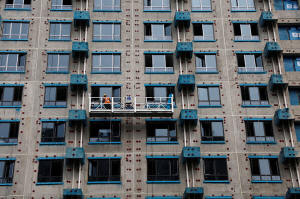Decline in China's property sector may be slowing, no recovery yet
 Send a link to a friend
Send a link to a friend
 [February 01, 2024] By
Liangping Gao and Ryan Woo [February 01, 2024] By
Liangping Gao and Ryan Woo
BEIJING (Reuters) -China's new home prices rose at the fastest monthly
pace in nearly 2-1/2 years and government land sales ended a 23-month
slump, according to recent government data and a survey, indicating the
rate of decline in the embattled property sector may be slowing down.
The figures come a few days after a Hong Kong court ordered the
liquidation of China's most debt-laden developer, China Evergrande more
than two years after its default brought a years-long property boom to a
shuddering halt.
Average prices across 100 cities grew for a fifth consecutive month in
January with a month-on-month gain of 0.15%, outpacing the 0.10%
increase in December, according to a survey by Chinese real estate
research firm China Index Academy. It was the fastest rise since a 0.20%
gain in August 2021.
The number of cities with month-on-month price growth also stood at 49
in January, up from 47 in December.
Separately, government revenue from land sales rose for the first time
in two years in December, up 1.8% from a year earlier, according to
Reuters calculations based on finance ministry data released on
Thursday.
Hwabao Trust economist Nie Wen said the data showed government policies
to support the real estate sector, once a pillar of the economy, could
start to have an effect in 2024 after two years of steep falls.

"There is a higher probability that the sales decline in 2024 will see a
marginal narrowing from the cliff-like decline in the previous two
years," Nie said.
The property market ended last year with the worst declines in new home
prices in nearly nine years, with investment dropping 9.6%, roughly the
same as the slide in 2022, and new construction starts plunging 20.4%,
data from the National Bureau of Statistics showed.
Over the past year, the world's second-largest economy has been
introducing policies to help revive the sector and restore buying
sentiment. This has helped stabilize the real estate market in some
cities, but home prices, and demand, remain low in many other places.
[to top of second column] |

A person works at a residential building construction site in
Beijing, China September 6, 2023. REUTERS/Tingshu Wang/File Photo

Total sales of 100 surveyed real estate enterprises dropped 33.3%
year-on-year by value in January, outstripping the decline a year
earlier by 1.6 percentage points, according to a separate survey by
the China Index Academy.
Sales are traditionally lower in January, as developers usually
conduct promotions before the year-end to boost their numbers, but
analysts said the downtrend indicates home-buying sentiment remains
weak.
MAJOR CITIES
This week, two major cities, Shanghai and Suzhou, followed Guangzhou
in easing home-buying curbs. A state-backed property project also
received the first development loan under a so-called whitelist
mechanism, according to reports in state media.
"Currently, as the easing policies in Guangzhou and Shanghai have
just been announced, the effects have not yet been reflected in the
transaction data," China Index Academy said.
Market activity may pick up after the Feb. 10 to 17 Lunar New Year
holidays, according to the research firm.
Evergrande's debt problems, however, are still casting a long shadow
over the sector, analysts said.
Fitch Ratings said on Wednesday the liquidation order "is likely to
be a lengthy process with high uncertainty and broader implications
for creditors investing in Chinese issuers' offshore debt and
China's property sector".
That means homebuyers' confidence in private developers is likely to
take an even longer time to recover, with market share continuing to
shift toward state-owned companies, Fitch added.
China's official new home prices data for January, which is based on
70 cities, is due to be released on Feb. 23.
(Reporting by Liangping Gao and Ryan Woo; Editing by Jacqueline Wong
and Jamie Freed and Miral Fahmy)
[© 2024 Thomson Reuters. All rights
reserved.]
This material may not be published,
broadcast, rewritten or redistributed.
Thompson Reuters is solely responsible for this content. |